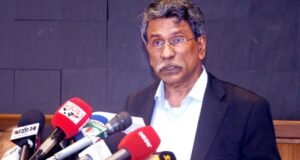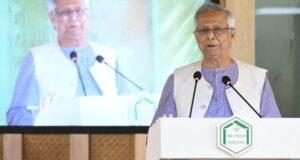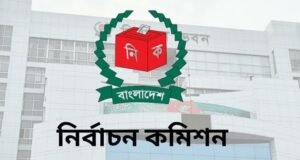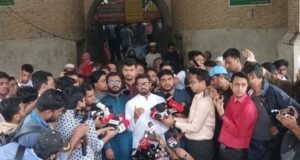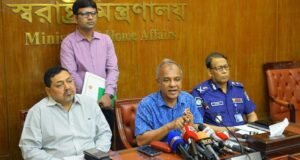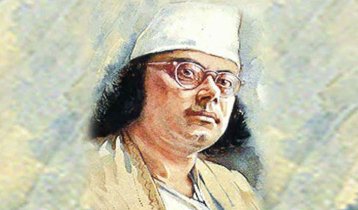
The 48th death anniversary of National Poet Kazi Nazrul Islam, widely revered for his limitless contributions to Bangla literature, is being observed in a befitting manner across the country on Tuesday.
Also celebrated as the ‘Rebel Poet’, Kazi Nazrul Islam is considered a pioneer in Bangla literature.
Marking his 48th death anniversary, several organisations and institutions are holding multiple programmes throughout the day commemorating the life and works of the great poet.
Dhaka University teachers, students, officials and employees visited the poet’s grave, offered wreaths and recite Fateha.
A delegation of the BNP led by Senior Secretary General Ruhul Kabir Rizvi also paid tribute to the Rebel Poet at his grave.
Marking the anniversary, people from all walks of life paid tribute to the poet with flowers. Tributes were paid to the poet by placing wreaths at his grave adjacent to Dhaka University Central Mosque in the morning. Members of the poet’s family also came to the poet’s grave to pay homage.
National Museum, Nazrul Research Centre, Bangla Department of Dhaka University, Nazrul Academy, Bangladesh Samajtantrik Dal (BSD), Samajtantrik Chhatra Front, Sursaptak, Ministry of Cultural Affairs, Bangla Academy, Dhaka University Teachers’ Association and Bashori- a Nazrul Research Centre and many other organizations paid homage to the poet by placing wreaths at his grave in the morning.
Several television channels, including Bangladesh Television (BTV), radio stations, including Bangladesh Betar, and online platforms are broadcasting special programmes commemorating the life and works of the National Poet.
Kazi Nazrul Islam, widely revered for his revolutionary and spectacular literary works in then-undivided India, was born in the Churulia village of Bardhaman in West Bengal, India, in 1899.
Nazrul had a brief 21-year-long literary career, during which he produced 2,600 songs, 600 poems, three books, and 43 essays, according to the Kabi Nazrul Institute.
In his early childhood, he had to work as a caretaker and as a muazzin in a mosque to support his family when his father passed away. He was forced to leave school at the age of nine in order to work for a professional “Leto” music group in Churulia, West Bengal.
While working with the group, he became familiar with Bangla and Sanskrit literature. A year later, he went back to school and enrolled at Matharun English School, but due to financial hardship, he dropped out once more in Class six.
After some time, police officer Kazi Rafizullah took him under his wing and enrolled him in Class seven at Darirampur School in Trishal, Mymensingh.
Within a few years of beginning military service in the British Army in 1917, Nazrul embarked on his literary career. He wrote the classic “Bidrohi” (The Rebel) in 1921 and founded “Dhumketu” (The Comet), a monthly journal, in 1922.
Due to his nationalist stance in the Indian Independence Movement, Nazrul found himself in the clutches of colonial British authorities. He wrote “Rajbandir Jabanbandi” (Deposition of a Political Prisoner) while he was incarcerated.
His works later inspired the Bangladesh Liberation War in 1971, and his poems inspired many to revolt against the oppression of Pakistan.
Freedom, humanity, love, and revolution are recurring themes throughout Nazrul’s remarkable literary creations. He was against radicalism and the constraints of caste, gender, and religious prejudice.
Nazrul also published short stories, novels, and essays, although his songs and poems have received the most praise. He is renowned for his liberal use of Arabic and Farsi terms in his writings and for popularizing Bangla ghazals.
He invented his own musical genre known as “Nazrul Geeti,” which consists of almost 4,000 songs he penned and composed music for, many of which were released on vinyl and HMV records.
In 1942, when Nazrul was 43 years old and suffering from an unidentified illness, he started to lose his voice and memory. His condition was later discovered to be “Pick’s disease,” a rare and fatal neurodegenerative disease, by a medical team in Vienna.
At the invitation of the Bangladeshi government and then President and Father of the Nation Bangabandhu Sheikh Mujibur Rahman, Nazrul’s family migrated to Bangladesh and settled in Dhaka in 1972. The government of Bangladesh conferred upon him the status of “National Poet” in the same year.
He was awarded the honorary DLitt by Dhaka University in 1974 and he received the Ekushey Padak in 1976, for his legendary contribution to Bangla literature and culture,
On August 27, 1976, the Rebel Poet breathed his last in Dhaka and was buried next to the mosque on Dhaka University campus, fulfilling a wish he had made in one of his poems.
 Weekly Bangla Mirror | Bangla Mirror, Bangladeshi news in UK, bangla mirror news
Weekly Bangla Mirror | Bangla Mirror, Bangladeshi news in UK, bangla mirror news


